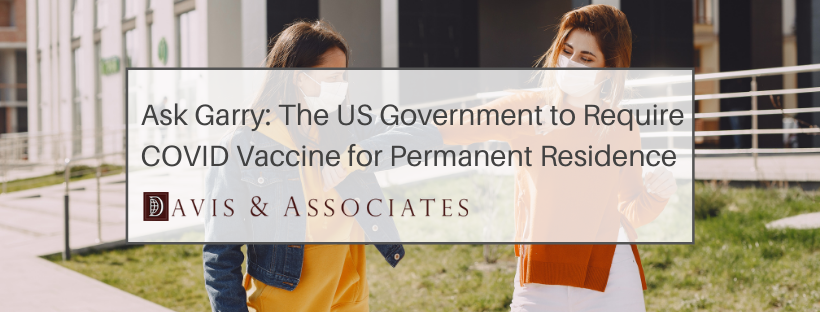
The US Government to Require COVID Vaccine for Permanent Residence
When someone is applying to become a permanent resident, the person must establish that they are “admissible” as defined in the Immigration and Nationality Act Section 212 (INA Section 212). For INA Section 212 purposes, admissible means legally eligible to be “admitted” to the US, such as on a visa. It also means eligible to become a permanent resident.
Medical Requirements to Become a U.S. Permanent Resident
One of the subsections of INA Section 212 relates to medical requirements for admission. One of the main requirements in this subsection is vaccination. A person either has to meet the vaccination requirements or prove qualification for a waiver of the requirement to be deemed eligible to become a permanent resident of the United States.
The Center for Disease Control helps regulate the types of vaccinations that are required for a person to be determined to be admissible for permanent residence. The COVID-19 pandemic has been devastating in many ways for many people throughout the world. The World Health Organization (WHO) has determined it to be a public health emergency of international concern (PHEIC). Quarantinable communicable disease, such as COVID-19, has been determined to be a Class A Inadmissible Condition, according to the CDC. They cite to 42 USC 264 and several executive orders to legally justify this determination.
Medical screenings of those applying for permanent residence often happen many months prior to the adjudication of the actual application for permanent residence. Thus having a negative screening at the time the medical examination is tendered to the US government in furtherance of the permanent residence application does not ensure the applicant is not carrying COVID-19.
COVID-19 Vaccine Now Required For Permanent Residence
The CDC has determined that a combination of vaccination and infection control practices – such as masking, social distancing, frequent and proper handwashing, etc. – provides the best available protection from COVID-19 for the applicants for permanent residence and for US communities in which they would live.
With this justification, the CDC is now requiring applicants for permanent residence in the US (called Adjustment of Status) and for those applying for permanent residence through immigrant visa applications at the US consulates throughout the world, to be immunized as a condition of eligibility. This went into effect on October 1, 2021. This is in addition to the other vaccinations already required under the law.
The required medical screening is performed by an authorized civil surgeon, a medical practitioner specifically authorized by the US government for the purpose of conducting and documenting the medical screening. An applicant for permanent residence must be able to prove the vaccination to the civil surgeon’s satisfaction to successfully complete the medical screening requirement.
Exceptions To The COVID-19 Vaccine Requirement
There are some exceptions to the requirement. For example, if a person is too young for the vaccine to be administered, the civil surgeon should document that on the medical examination form. Also if an applicant is what CDC defines as “contraindicated,” the vaccine requirement can be waived by the civil surgeon. An example of contraindicated is a severe reaction to the first dose of the vaccine such that it would be dangerous for that individual to have the second dose of the vaccine.
The last exception is if the person is coming from a country where the vaccine is not routinely available. This would apply in the US generally only if the civil surgeon documents that the vaccine is not available due to limited supply, and if waiting for the vaccine to become available would significantly delay to wait for the vaccine to become available.
A person who has moral or religious objections to getting the vaccine can request a waiver of the requirement. The doctor will need to document the objection and the person will need to request the waiver from USCIS or the US consulate in the context of the application for permanent resident. The government will decide whether waiving the requirement is justified. The request is made on an I-601 application and should include appropriate documentation to establish the moral or religious objection.
What If You Do Not Want The COVID-19 Vaccine?
If an applicant decides to refuse a COVID-19 vaccine and does not qualify for an exception or moral or religious grounds, the application will be denied.
We recognize the concerns many people have with the COVID-19 vaccine. However, choosing to not receive it could be equivalent to choosing not to become a permanent resident and being deemed inadmissible on medical grounds.
About Davis & Associates:
Davis & Associates is the immigration law firm of choice in Houston & North Texas including Dallas, Fort Worth, Plano, Frisco, McKinney and surrounding areas. Their attorneys provide expert legal counsel for all aspects of immigration law, including deportation defense, writs of habeas corpus and mandamus, family-sponsored immigration, employment-sponsored immigration, investment immigration, employer compliance, temporary visas for work and college, permanent residence, naturalization, consular visa processing, waivers, and appeals. Attorney Garry L. Davis is Board Certified in Immigration and Nationality Law by the Texas Board of Legal Specialization.
Dallas Contact Info:
Address: 17750 Preston Road Dallas, TX 75252
Phone: (469)957-0508
Houston Contact Info: Address: 6220 Westpark Dr, Suite 110, Houston, TX 77057
Phone: (832) 742-0066
